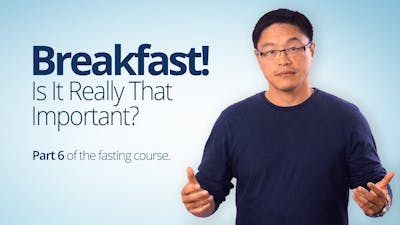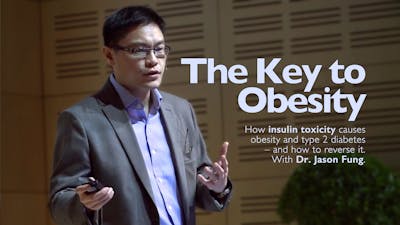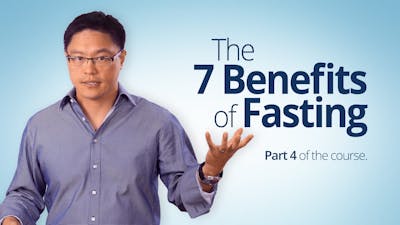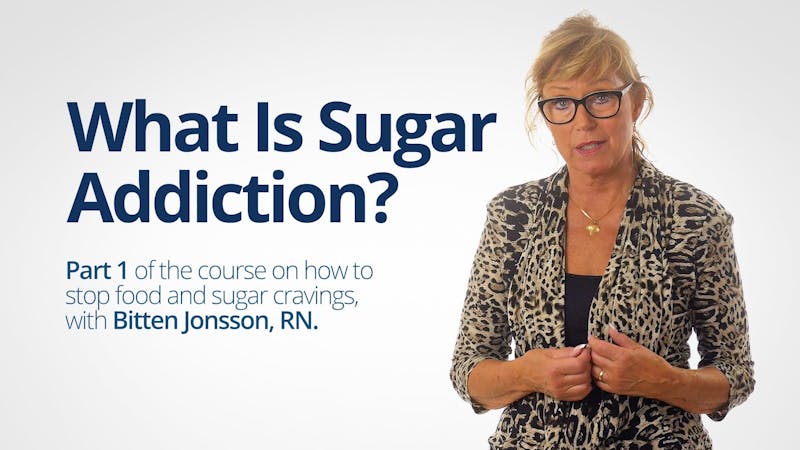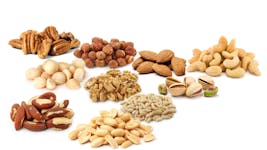How to lose weight
Do you have trouble losing weight? Or would you like to lose faster? You’ve come to the right place. Get ready for weight loss without hunger.
Our conventional ideas about weight loss – eat less, move more – require a lot of willpower. Counting calories, exercising for hours every day and trying to ignore your hunger? That’s needless suffering, and likely a waste of your time and precious energy. It’s weight loss for masochists.
Eventually people often give up. An excessive focus on counting calories has certainly not done much to reverse our current obesity epidemic.
The bottom line? Calories are not the only things that count in weight loss. Your weight is also hormonally regulated. If you reduce the levels of your fat-storing hormone, insulin, you’ll likely have an easier time losing excess weight.
Top 18 weight-loss tips
Are you ready? Here we go. Start at the top of the list (most important) and go down as far as you need. Click on any tip to read all about it. Perhaps you only need the first piece of advice?
- Choose a low-carb diet
- Eat when hungry
- Eat real food
- Eat only when hungry
- Measure your progress wisely
- Be persistent
- Avoid fruit
- Avoid beer
- Avoid non-caloric sweeteners
- Review any medications
- Stress less, sleep more
- Eat less of dairy products and nuts
- Supplement vitamins and minerals
- Use intermittent fasting
- Exercise wisely
- Achieve optimal ketosis
- Get your hormones checked
- Consider weight-loss pills (if desperate)
For extra support on your weight-loss journey, join our Facebook community.
Prefer watching a video?

This guide is written for adults with health issues, including obesity, that could benefit from losing weight.
We don’t recommend counting calories, which is controversial. To learn more about the rationale for this, see our guide on restricting calories for weight loss.
Controversial topics related to a low-carb diet, and our take on them, include saturated fats, cholesterol, whole grains, red meat and whether the brain needs carbohydrates.
1. Choose a low-carb diet
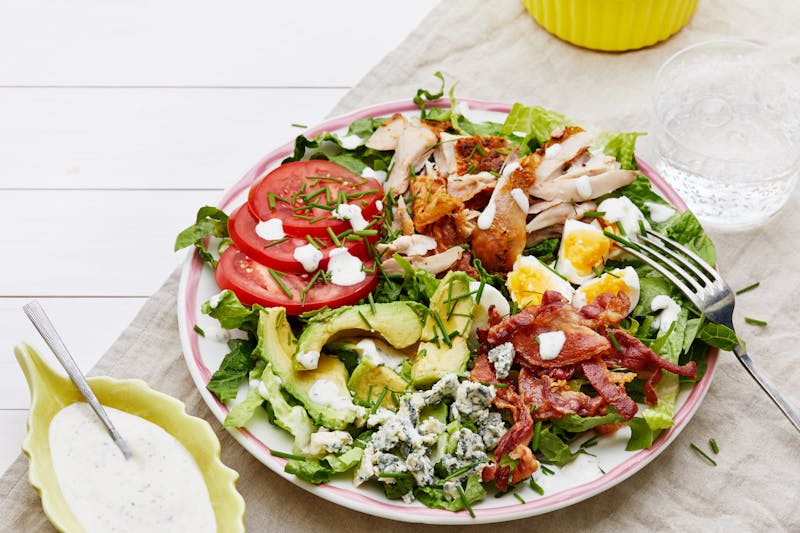
If you want to lose weight, consider starting by avoiding sugar and starch (like bread, pasta and potatoes). This is an old idea: for 150 years or more there have been a huge number of weight-loss diets based on eating fewer carbs. What’s new is that dozens of modern scientific studies have proven that, yes, on average low carb can be the most effective way to lose weight.
Obviously, it’s still possible to lose weight on any diet – just eat fewer calories than you burn, right? The problem with this simplistic advice is that it ignores the elephant in the room: hunger. Most people don’t like to “just eat less,” as it may result in having to go hungry forever. Sooner or later, a normal person will likely give up and eat, hence the prevalence of “yo-yo dieting.”
The main advantage of the low-carb diet is that it may cause you to want to eat less. Even without counting calories, overweight people tend to eat fewer calories on low carb.
Sugar and starch may increase your hunger, while avoiding them may decrease your appetite to a more manageable level.
A 2012 study also showed that people who had lost weight experienced far less reduction in total energy expenditure (the number of calories burned within a 24-hour period) when they followed a low-carb diet compared to a low-fat diet during weight maintenance — a 300-calorie difference, in fact.
According to one of the Harvard professors behind the study, this advantage “would equal the number of calories typically burned in an hour of moderate-intensity physical activity.” Imagine that: an entire bonus hour of exercise every day, without actually exercising.
Recently, an even larger and more carefully conducted study confirmed this metabolism-sparing effect, with different groups of people who had lost weight burning an average of between 200 and almost 500 extra calories per day on a low-carb maintenance diet compared to a high-carb or moderate-carb diet.
Bottom line: A low-carb diet can reduce your hunger, making it easier to eat less. And it might even increase your fat burning at rest. Study after study shows that low carb works for weight loss and that on average it improves important health markers.
Why low carb can help you lose weight
How to lose weight with a low-carb diet
Learn more about keto and low-carb
Do you want to know more about exactly what to eat on low carb, how to do it, potential problems and solutions — and find lots of great recipes? Check out our keto for beginners guide. Alternatively, you can make low carb even simpler by signing up for our free two-week keto challenge.
Meal planner and hundreds of videos
Get the full Diet Doctor experience with unlimited low-carb and keto meal plans, shopping lists and much more with a free membership trial.
Sign up!Low-carb video course
Do you want to watch a high-quality 11-minute video course on how to eat low-carb, high-fat (keto)? And about the most important things to think about? Sign up for free updates and you’ll get instant access:
2. Eat when hungry
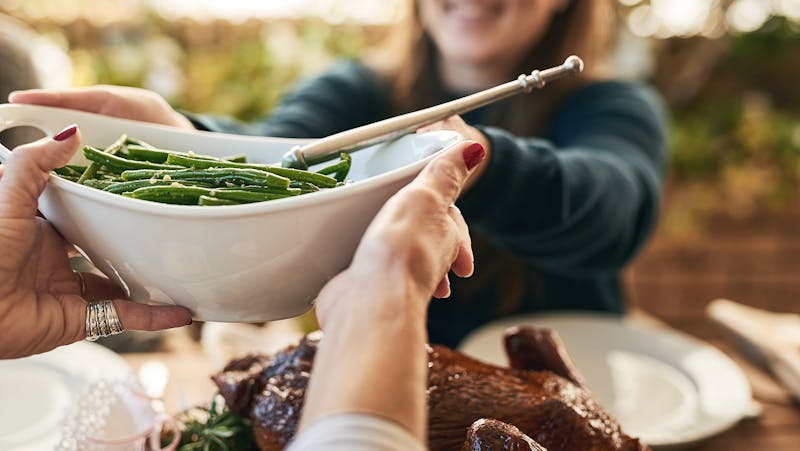
Don’t be hungry. The most common mistake when starting a low carb diet: reducing carb intake while still being afraid of fat. Carbs and fat are the body’s two main energy sources, and it needs at least one of them.
Low carb AND low fat = starvation
Avoiding both carbs and fat can result in hunger, cravings, and fatigue. Sooner or later many people can’t stand it and give up. The solution can be to eat more natural fat until you feel satisfied. For example:
- Butter
- Full-fat cream
- Olive oil
- Meat (including the fat)
- Fatty fish
- Bacon
- Eggs
- Coconut oil, etc.
Always eat enough, so that you feel satisfied, especially in the beginning of the weight-loss process. Doing this on a low-carb diet means that the fat you eat will be burned as fuel by your body, as your levels of the fat-storing hormone insulin are lowered.
You’ll become a fat-burning machine. You’ll be more likely to lose excess weight, often without hunger.
Do you still fear saturated fat? You may want to reconsider that. The fear of saturated fat is based on theories that recent studies suggest are misguided and incorrect.
Butter is a fine food. However, feel free to eat mostly unsaturated fat (e.g. olive oil, avocado, fatty fish) if you prefer. This could be called a Mediterranean low-carb diet and works great too.
Eating when hungry also implies something else: if you’re not hungry, you probably don’t need to eat yet. When on a keto diet you can trust your feelings of hunger and satiety again. Feel free to eat as many — or as few — times per day as you feel is right for you.
Some people eat three times a day and occasionally snack in between (note that frequent snacking could mean that you’d benefit from adding protein or fat to your meals, to increase satiety). However, there’s some evidence that frequent snacking isn’t wise when trying to lose weight.
Read more about why eating when hungry is smarter than counting calories
3. Eat real food

Another common mistake when eating a low-carb diet is getting fooled by the creative marketing of special “low-carb” products.
Remember: an effective low-carb diet for weight loss should be based primarily on real food.
Real food is what humans have been eating for thousands or likely millions of years, e.g. meat, fish, vegetables, eggs, butter, olive oil, nuts etc.
If you want to lose weight, avoid special “low-carb” products that are full of carbs. This should be obvious, but creative marketers are doing all they can to fool you (and get your money). They will tell you that you can eat cookies, pasta, ice cream, bread and plenty of chocolate on a low-carb diet, as long as you buy their brand. They’re often full of carbohydrates. Don’t be fooled.
How about low-carb bread? Be careful: if it’s baked with grains it’s certainly not low carb. But some companies still try to sell it to you as a low-carb option.
Low-carb chocolate is usually full of a kind of sugar alcohol — maltitol — that may actually be partially absorbed by the body, but which the manufacturer does not count as carbs. If the maltitol is absorbed, it is likely to raise blood sugar and insulin levels.
Here are three examples of what to avoid:
- Atkins’ fairy-tale cookies
- Julian Bakery’s high-carb low-carb bread
- The Dreamfields pasta fraud (that finally resulted in an 8 million dollar fine!)
These three companies are not unique. There are thousands of similar companies who may be trying to trick you into buying their “low-carb” products, that often contain starch, sugar alcohols, wheat flour, sweeteners, and other additives.
Two simple rules to avoid this:
- Don’t eat “low carb” versions of high carb stuff, like cookies, bars, chocolate, bread, pasta or ice cream – unless you are sure of the ingredients (ideally, by making it yourself).
- Avoid products with the words “net carbs” on them. That may be a way to deceive you.
Focus on eating good quality, minimally processed real food. Ideally the food you buy shouldn’t even have a list of ingredients (or it should be very short).
Read more about fake low-carb products
Less moderation, more quality
Finally — you may want to forget about the old “everything in moderation” diet motto. It isn’t necessarily helpful advice for people who struggle with weight — in fact, it may be exactly the opposite.
Don’t eat everything in moderation. Eat as much healthy food as you can, whenever you are hungry. Eat as little unhealthy food as you can – if possible, none at all.
4. Eat only when hungry
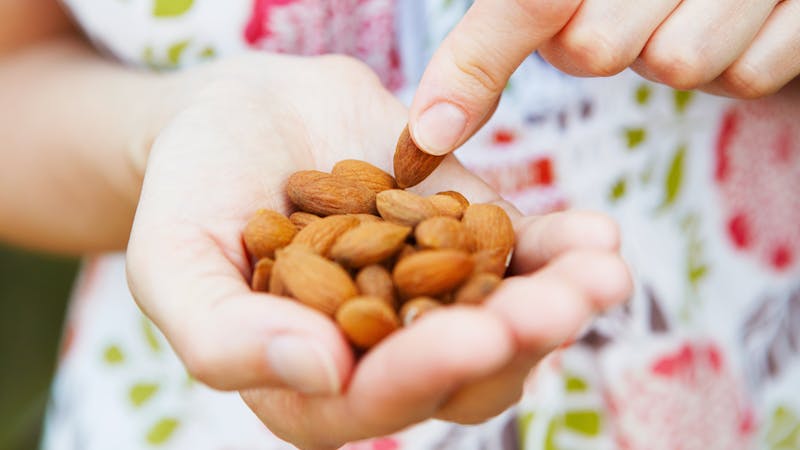
On a low-carb diet you should aim to eat when hungry (see tip #2 above). And if you’re not hungry? Don’t eat. Frequently eating more food than you need to stay satisfied will slow down weight loss.
Limit unnecessary snacking
Unnecessary snacking can be a problem on a keto diet too. Some things are easy to eat just because they’re tasty and readily available. Here are three common traps to watch out for on a keto or low-carb diet:
- Dairy products such as cream and cheeses. They work well in cooking, as they satisfy. But problems arise when you’re munching a lot of cheese in front of the TV in the evening — without being hungry. Be careful with that. Another problem might be having lots of cream with dessert, when you’re actually already full and just keep eating because it tastes good. Another common culprit is loads of heavy cream in the coffee, many times per day.
- Nuts. It’s very easy to eat until the nuts are gone, regardless of how full you are. A tip: According to science, salted nuts are harder to stop eating than unsalted nuts.Salted nuts tempt you to more overeating. Good to know. Another tip: Avoid bringing the entire bag to the couch, preferably choose a small bowl instead. Personally, I often eat all the nuts in front of me, whether I’m hungry or not.
- Low-carb baking. Even if you’re only using almond flour and sweeteners, snacking on baked goods and cookies usually provides additional eating when you’re not hungry — and yes, this will slow down weight loss.
Feel free to skip meals
Do you have to eat breakfast? Research has confirmed that the answer is no.
On a strict keto diet the hunger and urge to eat tend to decrease a lot, especially if you have excess weight to lose.
If this happens, be happy! Don’t fight it by eating food you don’t want. Instead, wait for the hunger to return before you eat again. This will save you both time and money, while speeding up your weight loss.
Some people fear that they will lose control if they don’t eat every three hours. The concern that this “urge to binge” will blow their diets completely leads them to obsessively snack all the time.
This constant snacking may be necessary in order to control the hunger and craving that may arise during a diet high in sugar and starchy carbs, but it’s usually unnecessary on a keto diet. Hunger will only slowly return and you should have plenty of time to prepare food or grab a snack.
Bottom line: To lose weight in a sustainable way, eat when you’re hungry – but only when you’re hungry. Forget the clock and listen to your body instead.
Learn more
5. Measure your progress wisely
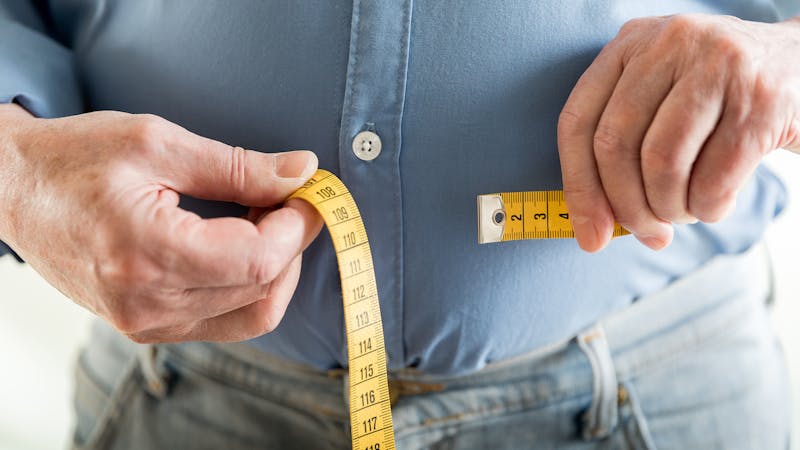
Tracking successful weight loss is sometimes trickier than you’d think. Focusing primarily on weight and stepping on the scale every day might be misleading, cause unnecessary anxiety, and undermine your motivation for no good reason.
The scale is not necessarily your friend. You may want to lose fat – but the scale measures muscles, bone and internal organs as well. Gaining muscle is a good thing. Thus weight or BMI are imperfect ways to measure your progress. This is especially true if you’re just coming off a long period of semi-starvation (which may accompany calorie-counting), as your body may want to restore lost muscle. Starting weight training and gaining muscle can also hide your fat loss.
Losing fat and gaining muscle means great progress, but you may miss this if you only measure your weight. Thus it’s smart to also track the disappearance of your belly fat, by measuring your waist circumference.
Here’s how to do it:
- Put the measuring tape around your middle, slightly above your belly button (to be exact: at the midpoint between your lowest rib and the top of your hipbone, at your side)
- Exhale and relax (don’t suck in your stomach)
- Make sure the measuring tape fits snuggly, without compressing your skin
- Measure
I recommend aiming for “good” but it’s not always realistic. Young people can usually achieve this, but for some middle-aged or older women, it may be a major victory to get all the way to “decent”.
Measuring progress
I suggest measuring your waist circumference and weight before starting your weight-loss journey and then perhaps once a week or once a month. Write the results down so that you can track your progress. If you want, you can measure more areas: around the buttocks, the chest, the arms, legs, etc.
Please note that your weight can fluctuate up and down several pounds from day to day, depending on fluid balance and digestive system contents. Don’t worry about short-term changes, follow the long-term trend instead.
If you can, try to check other important health markers when starting out, like these:
- Blood pressure
- Blood sugar (fasting blood glucose and/or HbA1c)
- Cholesterol profile (including HDL, triglycerides)
These markers are almost universally improved on a low carb diet, even before major weight loss.
PS: Don’t have a measuring tape at home? Try these options:
- Use any piece of string. Wrap the string around your waist and cut the string to fit your waist on day one. This string could magically appear to become longer and longer every week you wrap it around your waist.
- Comparing how an old pair of jeans fits is also a good option.
6. Be persistent

It usually takes years or decades to gain a lot of weight. Trying to lose it all as quickly as possible by starving yourself does not necessarily work well long term; instead it may be a recipe for “yo-yo dieting”.
What to aim for
It’s common to lose 2-6 pounds (1-3 kg) within the first week on a strict low-carb diet, and then on average about one pound (0.5 kg) per week as long as you have a lot of weight remaining to lose.
Every 5 pounds of fat loss roughly equals 1 inch lost around the waist (1 kilo = 1 cm).
Young males sometimes lose weight faster than this, perhaps twice as fast.
As you get closer to your ideal weight, the loss may slow down until you stabilize at a weight that your body feels is right. Very few people become underweight on a low-carb diet as long as they eat when hungry.
Read other peoples’ storiesInitial stalls
Are you coming off a period of semi-starvation (which can occur with calorie-counting)? Focus on your waist circumference and health markers (see advice #4) at first, as it sometimes takes several weeks before weight loss is apparent.
Weight-loss plateaus
Expect weight-loss plateaus: months where nothing seems to happen on the scale. Everybody hits them.
More: Why the scale may be lying to you, by Dr. Èvelyne Bourdua-Roy
How to keep the weight off long term
Losing a lot of weight long term and keeping it off will likely not happen unless you change your habits forever. If you lose weight and then return to living exactly the way you did when you gained weight, don’t be surprised when the excess weight returns. It normally will.
Maintaining weight loss usually requires long-term change and patience. As tempting as it may be, don’t fall for one of these magical diet scams.
Forget quick fixes: If you lose some weight every month, eventually you may get rid of all your excess weight. That’s inevitable progress. That’s what you want.
PS: Long-term change is hardest in the beginning, especially during the first couple of weeks. It’s like quitting smoking. Once you develop new habits it becomes easier and easier every week. Eventually it may come naturally.
For inspiration and tips, check out some of our long-term weight maintenance success stories:
- Karen: Maintaining a 70-pound weight loss for five years
- How Melissa lost 100 pounds with a keto diet, and kept it off for 15 years
- Brian: Maintaining a 100-pound weight loss for seven years
How to lose weight faster
Keep reading!
7. Avoid eating fruit
This piece of advice is controversial as fruit has an almost magical health aura today. People may believe that fruit is nutritious but unfortunately fruit contains a lot of sugar – around 10% by weight (the rest is mostly water). Just taste an orange or a grape. Sweet, right?
Five servings of fruit per day are equivalent to the amount of sugar in 16 ounces of soda (500 ml).
Sugar from fruit can shut down fat burning. Eating a lot of fruit can increase your hunger and slow your weight loss.
Bottom line: Fruit is candy from nature.
Isn’t fruit natural?
Most people believe that fruit is natural, but today’s fruits in the grocery store have very little in common with what fruits looked like before they were cultured. Modern domesticated fruits are larger, less bitter, and have thinner peels and smaller seeds. This makes them tastier and easier to eat – and because of their increased size, they may provide more sugar per piece of fruit than their earlier counterparts.
8. Avoid drinking beer
Beer contains rapidly digested carbs that shut down fat burning. That may be why beer is sometimes referred to as “liquid bread.” There’s a good reason for the term “beer belly.”
Here are smarter (lower-carb) alcoholic options for losing weight:
- Wine (red or dry white)
- Dry champagne
- Hard liquor like whisky, cognac, vodka (avoid sweetened cocktails – try vodka, soda water, lime instead)
These drinks hardly contain any sugar or digestible carbohydrates so they’re better than beer. However, large amounts of alcohol might slow weight loss somewhat, so moderation is still a good idea.
9. Avoid non-caloric sweeteners
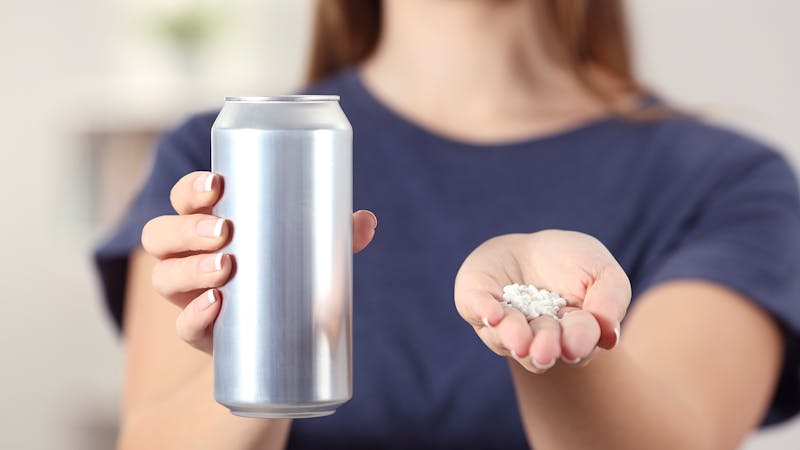
Many people replace sugar with non-caloric sweeteners in the belief that this will reduce their calorie intake and cause weight loss. It sounds plausible. Several studies, however, have failed to show obvious positive effect on weight loss by consuming non-caloric sweeteners instead of plain sugar.
According to scientific studies, non-caloric sweeteners may increase appetite and maintain cravings for sweet food.
Study: Avoiding diet beverages helps women lose weight
This might be because the body increases insulin secretion in anticipation that sugar will appear in the blood. When this doesn’t happen, blood sugar drops and hunger increases. Whether this chain of events regularly takes place is unclear. Something odd happened when I tested Pepsi Max though, and there are well-designed studies showing increased insulin response when using non-caloric sweeteners.
Additionally, for people who are susceptible, non-caloric sweeteners can maintain a desire for sweets and lead to sugary or starchy snack cravings.
If you’re having trouble losing weight, I suggest that you avoid sweeteners. As a bonus, you’ll likely find it easier to enjoy the natural sweetness of real food, once you’re no longer adapted to the overpowering sweetness of processed low-carb food products and “diet” sodas.
Sugar addiction
Do you find the idea of avoiding sweeteners almost impossible to imagine? Addiction-like relationships to sugar and carbohydrate-rich foods can be overcome. Check out our video course with addiction specialist Bitten Jonsson, RN
10. Review any medications
Many prescription drugs can stall your weight loss. Discuss any change in treatment with your doctor. Here are the three most common offenders:
- Insulin injections, especially at higher doses, are probably the worst obstacle for weight loss for many people.There are three ways to reduce your need for insulin:
A. Eat fewer carbs, which makes it easier to lose weight. The fewer carbs you eat the less insulin you need.Remember to lower your doses if you can.
B. If this isn’t enough, treatment with metformin tablets (at a dose of 2–3 grams/day) can decrease the need for insulin (at least for people with type 2 diabetes).C. If this is not enough to get off insulin (again, for people with type 2 diabetes) you could try newer promising drugs like Victoza/Saxenda (liraglitude) or Byetta (exenatide). These reduce the need for insulin and may cause weight loss, but possible long-term side effects are still unknown.
 Other diabetes medications, like insulin-releasing tablets (e.g. sulfonylureas), often lead to weight gain.These include: Minodiab (glipizide), Euglucon (glibenclamide), and Daonil (glyburide). Tablets like Avandia, Actos, Starlix and NovoNorm also encourage weight gain. But not metformin. More on diabetes
Other diabetes medications, like insulin-releasing tablets (e.g. sulfonylureas), often lead to weight gain.These include: Minodiab (glipizide), Euglucon (glibenclamide), and Daonil (glyburide). Tablets like Avandia, Actos, Starlix and NovoNorm also encourage weight gain. But not metformin. More on diabetes- Cortisone as an oral drug is another common issue (e.g. prednisolone). Cortisone may cause weight gain in the long run, especially at higher doses (e.g. more than 5 mg prednisolone per day).Unfortunately, cortisone is often an essential medication for those who are prescribed it, but the dose should be adjusted frequently so you don’t take more than you need. Asthma inhalers and other local cortisone treatments, like creams or nose sprays, can also affect weight.
These other medications can also cause problems:
- Neuroleptics/antipsychotic drugs can often encourage weight gain, especially newer drugs like Zyprexa (olanzapine).
- Some antidepressant medications can cause weight gain, especially the older tricyclic antidepressants (TCAs) such as Tryptizol/Saroten (amitriptyline), and Anafranil (clomipramine); as well as newer drugs such as Remeron (mirtazapine).Lithium (for manic-depressive disorder) often causes weight gain. The most common antidepressants known as SSRI’s, for example, Celexa (citalopram) and Zoloft (sertraline) do not appear to impact weight significantly.More on depression
- Some contraceptives may contribute to a slight weight gain, primarily those that contain only progesterone and no estrogen, for example the mini-pill, the contraceptive injection, or a contraceptive implant.More on fertility
- Blood pressure medication in the form of beta blockers may lead to weight gain in some individuals. These drugs include: Seloken, Lopressor (metoprolol), and Tenormin (atenolol). More on high blood pressure
- Epilepsy drugs may cause weight gain (e.g. carbamazepine and valproate).
- Allergy medications and antihistamines can interfere with weight loss, especially at high doses. Cortisone is even worse (see above). More on allergies
- Antibiotics may possibly lead to a temporary weight gain by disturbing the gut microbiota and increasing the amount of energy we absorb from food.This is still speculative for humans but it’s a reason not to use antibiotics unless you truly need it.
11. Stress less, sleep more

Have you ever wished for more hours of sleep and a less stressful life in general? Most people have – stress and lack of sleep can be bad news for their weight.
Chronic stress and inadequate sleep may increase levels of stress hormones such as cortisol in your body. This can cause increased hunger and may result in weight gain.
You should also make an effort to get enough good sleep, preferably every night. Strive to wake up refreshed of your own accord, independently of the alarm clock. If you’re the kind of person who always gets brutally woken up by the alarm ringing, you might never be giving your body completely adequate rest.
One way to combat this is to go to bed early enough for your body to wake up autonomously before the alarm clock goes off. Letting yourself get a good night’s sleep is another way of reducing stress hormone levels.
Sleep deprivation, on the other hand, goes hand in hand with sugar cravings.
Sleep issues?
Do you have trouble sleeping even if there’s ample time for it? Here are five tips from an expert:
- Stick to the same bedtime every evening. In the long run, this will help your body prepare for sleep at that time.
- No coffee after 2 pm. Just don’t – and remember that it takes time for caffeine to leave your body.
- Limit your alcohol intake to three hours before bedtime. While booze might make you woozy, it worsens quality of sleep.
- Limit exercise in the four hours before bedtime. Physical activity can make you wound up and make it difficult to go to sleep for several hours afterwards.
- Get 15 minutes of sunlight every day. This is good for your circadian rhythm (your “body clock”).
Finally, make sure that your bedroom is dark enough, and stays at a pleasant temperature. Sleep well!
Difficult, but worthwhile
Many may find the above guidelines difficult to follow, perhaps because of a lack of time (or the equivalent – small children!). But stressing less and sleeping more doesn’t just feel good. It can also play a part in helping you get leaner.
12. Eat less of dairy products and nuts
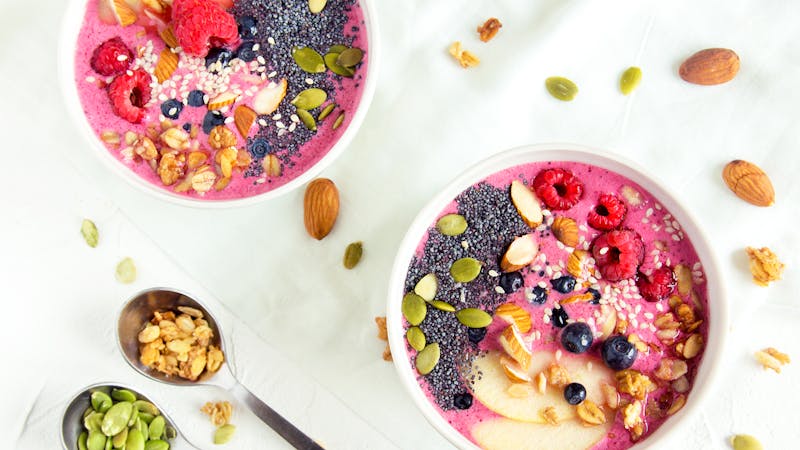
Can you eat as much as you like and still lose weight? This often works well with a low-carbohydrate diet, as appetite regulation often improves.
However, despite the fact that a low-carbohydrate diet generally makes it easier to eat just enough, there are foods classified as low carb which become a problem in larger quantities. If you find yourself having a hard time losing weight on a low carb diet, you could try to be more careful with:
- Dairy products (yogurt, cream, cheese)
- Nuts
Dairy products contain varying amounts of lactose (milk sugar), which could potentially slow down weight loss. Consequently, cutting back on dairy products may help accelerate weight loss.
This applies especially to dairy products typically lacking in fat, such as regular milk and various yogurts. But be careful with full-fat dairy such as cream and cheese all the same, as they are easy to overindulge in.
Exempt from all these dairy-product warnings is butter, which is almost pure fat. Generally speaking, butter may be consumed as desired – but pay attention to fullness cues if your goal is weight loss. If it is overconsumed, dietary fat will be burned for fuel instead of body fat.
Low-carb and dairy-free recipes
Nuts, the second food to watch, contain a fair amount of carbohydrate, and it’s very easy to unwittingly scarf down large quantities.
For someone following a strict keto diet with a 20 grams of carbs per day allowance, this means that consuming 100 grams of cashews (which happens in a flash!) will have filled their daily quota. Peanuts tend to be around 10-15% carbohydrate – not putting them in the clear either.
So, for those of you having trouble losing weight: use nuts sparingly. When in a situation where nuts are an absolute must, know that the most harmless ones carb-wise are macadamia nuts (usually around 5% carbs), or Brazil nuts (4%).
13. Supplement vitamins and minerals

Your body needs a certain amount of essential vitamins and minerals to function properly. What happens when you don’t get enough of them? What happens when you eat too little food or when the food you eat isn’t sufficiently nutritious? It is possible that our bodies catch on and reply by increasing hunger levels.
After all, if we eat more, we increase the chances of consuming enough of whatever nutrient we are lacking. On the other hand, reliable access to vitamins and minerals could perhaps mean decreased hunger levels and decreased cravings, thereby promoting weight loss.
The above is speculation without strong supporting evidence. But there are a few studies which suggest it might not be far from the truth.
Vitamin D
A lack of vitamin D could be the most common deficiency in northern countries such as Canada and some of the US. Three recent studies indicate that, when compared to a placebo, a vitamin D supplement cold help decrease your fat mass or waist measurement.
In one of the studies, 77 overweight or obese women received either a supplement of 1000 units of vitamin D or a placebo, every day for 3 months. Although the total weight loss was similar, those who took the vitamin D supplement decreased their body fat by 2.7 kg (6 pounds), on average. This was significantly more than the placebo group, whose average fat loss was only 0.4 kg (less than 1 pound).
Multivitamins
A study from 2010 involved around a hundred women with weight issues, separating them into three groups. One group received a daily multivitamin supplement, the other a daily calcium supplement, and the last group only a placebo. The study went on for six months.
Unsurprisingly, the results showed that nothing had happened to the weight of the women receiving calcium or the placebo. However, the group that took the multivitamin lost more weight – an average of 3.6 kg (8 pounds) more – and improved several of their health markers. Among other things, their basal metabolic rate (the rate at which the body burns calories when at rest) increased.
Conclusion
Nutrient-dense, whole food is certainly the foundation of weight loss. But an adequate amount of vitamin D can be difficult to ingest via food, especially for those who are vegetarian or don’t eat fatty fish (the main dietary source of vitamin D) on a regular basis. In the case of a lack of sun (such as during the darker months of fall and winter), it may be wise to supplement for health reasons – and perhaps even for your weight.
In addition, if you’re overweight and not entirely sure that your diet provides enough nutrients, it may be worthwhile to take a multivitamin pill.
While the evidence is not strong, there is likely little downside and you may see a small benefit.
14. Use intermittent fasting
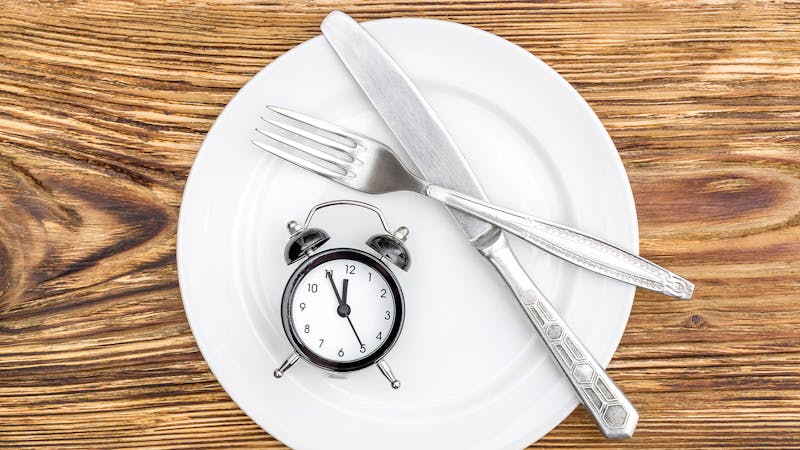
There are many things to consider before moving on to this tip #14, but don’t let this concern you. This is one of the most effective weapons available to lose weight. It may be perfect if you are stuck at a weight-loss plateau despite “doing everything right” – or to speed up your weight loss.
This weapon is called intermittent fasting. It means exactly what it sounds like: not eating during a specified time interval.
Recommended first option – 16:8
Probably the most popular option is fasting for 16 hours (including sleep), which is usually easy to do on a keto diet. It requires trading breakfast for a cup of coffee (or some other non-caloric fluid) and having lunch as the first meal of the day. Fasting from 8 pm to 12 noon – for example – equals 16 hours of fasting. Another option is to skip dinner: eat breakfast and lunch within 8 hours — for instance, 8 am to 2 pm — and then don’t eat again until 8 am the next morning.
There are many other versions of intermittent fasting, but this 16:8 method (16 hours of not eating with an 8-hour eating window) is the one we recommend as a first option. It’s often effective, generally easy to do and does not require counting calories.
You can do a 16:8 fast as often as you like. For example twice a week, on weekdays only, or every single day. The more often you do it, the more effective it may be.
In fact, on a keto diet some people spontaneously fall into this habit, as their appetite is reduced (see weight loss tip #4, eat only when hungry).
Other kinds of intermittent fasting
There are many other options. Basically, the longer periods are harder to do but could potentially be more effective. Here are two more common options:
- Fasting for 24 hours (often dinner to dinner) once or twice a week. This can be effective and easy to do for some people, especially on a keto diet, which usually reduces appetite.
- The 5:2 diet. Eat as much as you need to feel satisfied 5 days of the week and then eat calorie-restricted on two days (500 calories per day for women, 600 calories for men). This requires calorie counting and more planning, but some people still find they enjoy it.
What about eating when hungry?
Doesn’t advice on intermittent fasting contradict the advice to eat when hungry? Yes it does, somewhat.
We recommend eating when hungry as a first option, and we recommend always eating until you feel satisfied at meals. But if this is not effective enough, then intermittent fasting is a very powerful addition. Remember – and this is crucial – that between fasting periods you’re still supposed to eat until satisfied.
Intermittent fasting is not the same thing as obsessively counting calories and starving yourself 24-7. Starving yourself may be a recipe for misery and failure.
Intermittent fasting is about eating all that your body needs, while still allowing it to sometimes briefly rest from constant feeding.
What’s acceptable to drink during fasts?
During a fast you can’t eat, but you should definitely drink. Water is the drink of choice, but coffee and tea are also great options. During longer fasts it can be wise to add some salt too, or drink bouillon.
Anything you drink should ideally be zero calories. But it may be acceptable to modify this by adding a small amount of milk or cream in your coffee or tea – if you absolutely need it to enjoy your drink.
What to eat between fasts
So what should you eat when you are not fasting? Well, if your goal is to lose weight, we suggest following all the tips above, including eating a low-carb diet. Combining this with intermittent fasting is a great combination.
On a low-carb diet your hunger is reduced and it’s much easier to do a period of fasting. Also, your fat burning is already increased – so when fasting you’ll more easily burn plenty of fat.
So, while on a low-carb diet the fasting periods may become both easier to do and more effective. 1 + 1 equals 3.
Who should not do intermittent fasting
Intermittent fasting can be a great idea, but not everyone should do it:
- If you have a history of disordered eating then intermittent fasting may not be right for you. We recommend consulting with your physician before trying intermittent fasting.
- If you are stressed out or sleep deprived, then take care of that problem first (see weight loss tip #11) or fasting may be too stressful for your body.
- If you are on any medication – especially insulin – the doses may need to be adjusted when fasting. Discuss this with your doctor first.
- Growing children, pregnant women and breastfeeding women should not do longer fasting periods, as they have an increased nutrient needs. We recommend eating when hungry and using the 14 tips above if you need to lose weight.

